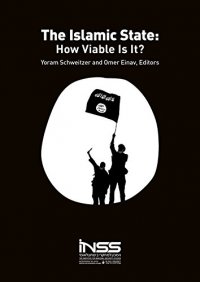
Free on 27th Dec 16
![]()
or borrow free on Kindle Unlimited.
Also Available as:
Print Edition
The Islamic State burst onto the Middle East scene as an entity whose conduct
and very essence challenge the existing regional order. With its military conquests
in Iraq and Syria, its establishment of branches elsewhere in the Middle East and
beyond, its state-like governance in the areas under its control, and the cruelty
it typically exhibits, the Islamic State has become the focus of regional and
international interest and concern. The articles compiled in The Islamic State:
How Viable Is It? examine ways of dealing with one of the most salient military,
sociopolitical, cultural, and intellectual challenges on today’s global agenda.
There are numerous question marks surrounding the future of the Islamic
State. Relating to historical, religious, military, economic, social, cultural, and
geopolitical aspects, the articles in this volume address many of the questions
prompted by the dramatic emergence of the Islamic State and examine ideas on
how to grapple with this phenomenon. Taken together, they paint a portrait of the
complex reality that has evolved in the Middle East in recent years, and attempt
to outline future trends. In addition to this multidisciplinary interpretation of the
Islamic State and its related challenges, the collection presents insights that can
assist in formulating policies to cope with this challenging situation.
Yoram Schweitzer is a senior research fellow and head of the Program on
Terrorism and Low Intensity Conflict at INSS. He served in Israel’s intelligence
establishment as head of the International Terror section of the IDF, and as a
member of the POW-MIA Task Force in the Prime Minister’s Office. He has also
served as a consultant in counterterrorism in the Ministry of Defense and the
Prime Minister’s Office, and lectures frequently on the subject both in Israel
and abroad. He is the co-author of The Globalization of Terror: The Challenge
of al-Qaida and the Response of the International Community; Al-Qaeda and
the Internationalization of Suicide Terrorism; and Al-Qaeda’s Odyssey to the
Global Jihad.
Omer Einav, a doctoral student in history at Tel Aviv University, is a research
associate at INSS and the editor of the INSS Hebrew blog. His research focuses
on the Israeli-Palestinian conflict, Syria, and Lebanon. His doctoral thesis deals
with football as a tool for examining relations between Jews and Arabs in Palestine
under the Mandate. He holds a BA in Islamic and Middle Eastern Studies and
international relations from the Hebrew University of Jerusalem, and an MA in
the history of the Middle East and Africa from Tel Aviv University.












